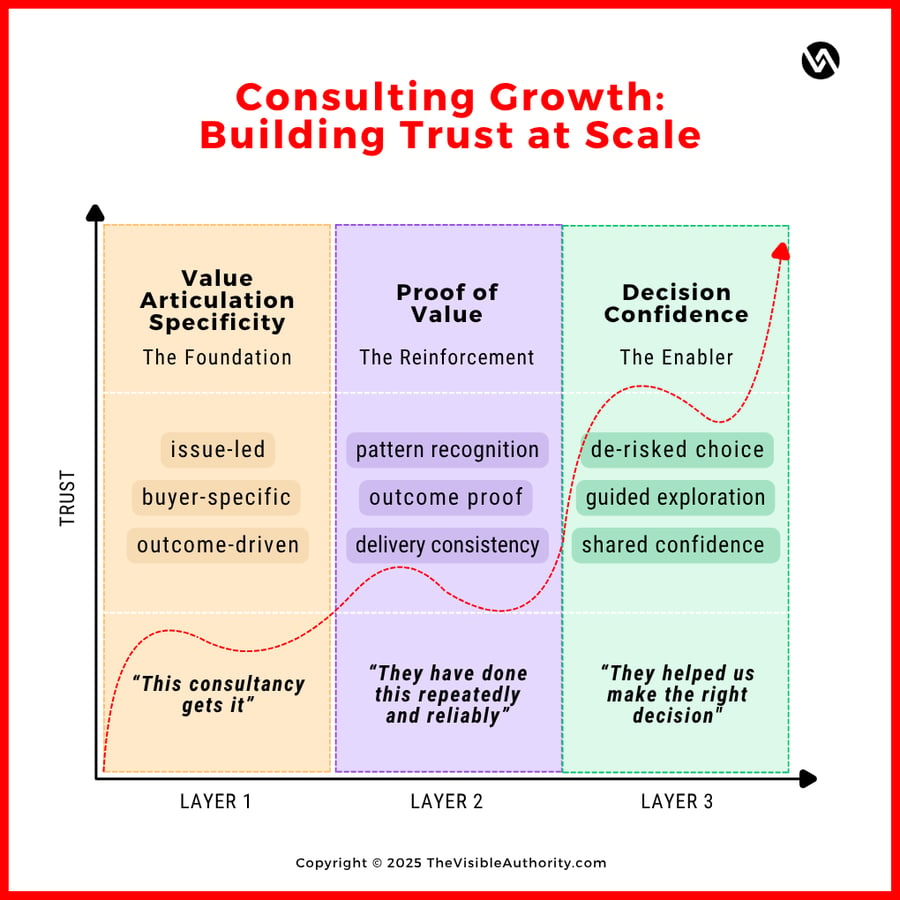
How Consulting Firms Can Build Trust at Scale

Consulting success is built on ‘trust at scale’. And too many consultancies don't get that.
According to findings by Source, 94% of CxOs said they consume thought leadership “often” or “sometimes” – up from 84% the previous year. Another study by Source reported that, in recent years, the strongest differentiators among consulting firms have been deep industry knowledge and access to subject matter experts.
Thought leadership, subject matter expertise, and visibility – all these notions fall under the umbrella of communicating and building trust.
Yet most consulting firms try to build trust with vanity claims:
- We transform your organisation
- We drive substantial growth
- We deliver impact and results
They believe bold outcome language signals confidence. In reality, it erodes trust. What consulting firms see as their transformational expertise, buyers often read as a lack of substance.
Real trust is built when a consulting firm proves that it:
- deeply understands the buyer’s problem,
- has done the required transformation multiple times before, and
- is experienced in helping buyers make confident decisions.
That’s how consulting firms prevent stalled or ghosted proposals: by replacing persuasion with predictive trust that converts interest into commitment. And that’s what I’d like to discuss in this article.
Consulting Clients See Through Vanity Claims
Vanity claims – high-impact promises that sound confident yet lack substance – are useless. Modern buyers see right through them. In fact, they are so widespread that decision-makers treat them as background noise.
Buyers are more informed than ever. Their decisions are driven by independent research, hyper awareness of budget restraints, and the need to minimise risk. So when a consulting firm relies on grand claims without delivering meaningful specifics, consulting service buyers take it as a sign that the consultancy doesn’t actually have the means, expertise, or experience delivering the claimed value.
And that’s how trust erodes.
Because buyers are not looking for a consulting firm that makes the loudest, boldest claim. They are looking for one with deep expertise, a thorough understanding of the buyer’s problem, and a proven strategy for resolving it.
When a consulting firm makes generic statements full of consulting jargon (‘empowering your digital transformation’ and the like), it forces its target audience to connect the dots and figure out this firm’s relevance and capabilities. And most buyers won’t do that. Not in the highly competitive consulting market.
That’s why it comes as no surprise that high-performing consulting firms consistently win business. They make it easy for their buyers to decide to engage. Instead of trying to entice prospective clients with bold but ultimately meaningless statements, they show how their deep expertise can solve very specific problems effectively. That’s the foundation of their trust-building.
The Three Layers of Trust
Trust is not created overnight. It accumulates. The good news is that past a certain point, it has compounding effects.
In our work with consulting firms, we’ve learned that trust has three layers:

Consulting Growth: Building Trust at Scale
#1. Value articulation specificity – the foundation of trust
The first layer is about clarity – making it obvious to the buyer that the consulting firm truly understands their problem.
When the value proposition is sharply defined (i.e., issue-led, outcome-driven, audience-specific), the buyer instantly feels, “This consultancy gets it.”
Specificity creates familiarity. It tells the client, "We’ve solved this before." And it does so way more convincingly than “we deliver amazing outcomes” statements.
#2. Proof of value – the reinforcement of trust
Specificity opens doors; proof of value gets consultancies invited in. Buyers are cautious decision-makers who need reassurances that the risk is minimal (or non-existent).
Repeated patterns of similar projects turn claims into evidence. Proof of value comes in various forms:
- An ideal client success journey
- Outcome stories from clients facing similar challenges
- Thought leadership that inspires action
All of these help grow trust in the buyer’s mind: “They’ve done this repeatedly and reliably.”
#3. Decision confidence – the enabler of trust
Too many consulting proposals are lost not to competitors but due to client hesitation. In one of my favourite books, The JOLT Effect, Matt Dixon and Ted McKenna explain that buyers rarely doubt the service firm. They doubt themselves.
They're grappling with questions like:
- Have we explored all the alternatives? (afraid of not having done enough research)
- Can we really implement this successfully? (concerned about the internal capabilities)
- Are we making the best decision for our company? (not sure if this is what they need)
- Could I get in trouble with this decision? (career threat)
Trust at this level involves assisting buyers to answer those questions carefully but confidently.
By reducing the risks associated with their choices, guiding their exploration, and building shared confidence, consulting firms shift from persuasion to collaboration. It’s not about persuading more forcefully, it’s about helping clients feel secure in making their decision.
Recommended reading: How Consulting Firms Can Overcome Prospects’ Indecisiveness
How a Consulting Point of View Turns Trust into Influence
While value articulation specificity, proof of value, and decision confidence are qualities or characteristics to aim for, a consulting point of view (PoV) is a mode of communicating trust.
A PoV frames why buyers’ challenges exist, what’s changing in their world, and why this consulting firm is uniquely positioned to help address them.
A consultancy’s PoV informs all external and internal messaging.
To help consulting firms develop a strong PoV, we have designed this canvas:
 The Consulting Point-of-View Canvas
The Consulting Point-of-View Canvas
We offer an in-depth explanation in our article on consulting PoVs, but here is the gist:
The canvas maps the client’s journey from yesterday to tomorrow:
- Yesterday (the status quo): This describes how things currently work for clients.
- The downside of the status quo: Here, consulting firms have an opportunity to highlight why the current way of operating is unsustainable.
- Tomorrow (the ideal state): This is the consulting firm’s vision of how things should work.
- The upside of changing: Finally, consulting firms can show the benefits of moving from the status quo to the transformed state.
Additionally, the canvas is divided into three “lenses” to make sure a PoV is grounded in the client’s reality:
- How their world works: This lens captures the external environment in which clients operate. By articulating these forces, consulting firms showcase their understanding of the broader context shaping prospects’ challenges and opportunities.
- How their organisation works: Here, the focus shifts inward – to the client’s structures, systems, and ways of operating, with consulting firms highlighting where friction occurs.
- Where they focus: This lens looks at the leadership agenda in clients’ organisations and what keeps senior-level decision-makers up at night.
Trust is the antidote to clients’ indecisiveness. Using this framework, consulting firms can build trust with clients across the three layers discussed earlier.
Recommended reading: How a Consulting Point of View Turns Expertise Into Influence
In Conclusion: Trust Is the Only Real Differentiator
When consulting firms get all three layers right – 1) value articulation specificity, 2) proof of value, and 3) decision confidence – they can create trust at scale. This is what separates consulting firms that win consistently from those that end up chasing prospects and have to offer discounts to compete.
And in a consulting market drowning in sameness and AI-generated noise, trust becomes the only real differentiator left.
Firms that replace vanity claims with a clear point of view, demonstrate a proven track record, and guide clients to confident decisions become true partners to their clients.
Trust is not optional in this day and age. It’s at the foundation of sustainable growth in consulting.
Interested in receiving all our learnings to build a better consulting firm?
Subscribe to our newsletter.

Luk’s extensive career in the consulting business, which spans more than 20 years, has seen him undertake a variety of influential positions. He served as the European CHRO for Nielsen Consulting (5,000 consultants in the EU), founded iNostix in 2008—a mid-sized analytics consultancy—and led the charge in tripling revenue post-acquisition of iNostix by Deloitte (in 2016) as a leader within the Deloitte analytics practice. His expertise in consultancy performance improvement is underlined by his former role on Nielsen's acquisition evaluation committee. After fulfilling a three-year earn-out period at Deloitte, Luk harnessed his vast experience in consultancy performance improvement and founded TVA in 2019. His advisory firm is dedicated to guiding consulting firms on their path to becoming high-performing firms, drawing from his deep well of consulting industry expertise and financial acumen.

